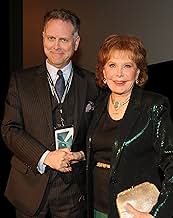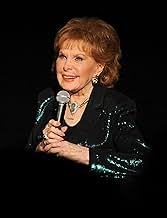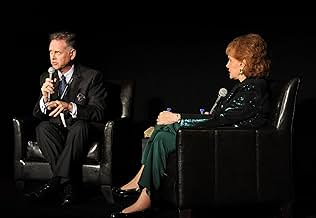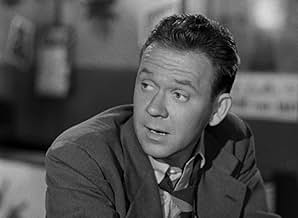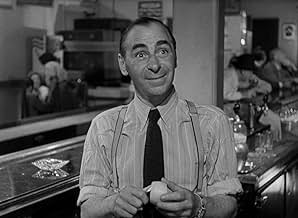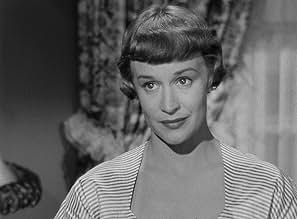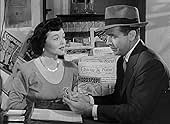PUNTUACIÓN EN IMDb
7,3/10
3 mil
TU PUNTUACIÓN
Añade un argumento en tu idiomaEx-con Rocky Mulloy seeks the real culprit in the crime for which he was framed in a night world of deceptive dames and double crosses.Ex-con Rocky Mulloy seeks the real culprit in the crime for which he was framed in a night world of deceptive dames and double crosses.Ex-con Rocky Mulloy seeks the real culprit in the crime for which he was framed in a night world of deceptive dames and double crosses.
- Dirección
- Guión
- Reparto principal
Hy Averback
- Bookie
- (as Hy Averbach)
Leon Alton
- Bartender
- (sin acreditar)
Robert Bice
- Castro's Gunman
- (sin acreditar)
Ralph Brooks
- Nightclub Patron
- (sin acreditar)
Paul Cristo
- Waiter
- (sin acreditar)
Sayre Dearing
- Cop
- (sin acreditar)
Reseñas destacadas
Good dialog and a fast-moving story make this one of the better somewhat-unknown film noirs of its day.
Dick Powell and Jay Adler wisecrack their way through this film with some humorous sarcasm. Both are a lot of fun to watch. Powell was in his prime for this kind of role. He was much more mature looking than in his earlier musical days and he fits the part of a tough detective to a tee. His dialog with the tough cop, played by Regis Toomey, also is excellent stuff.
Jean Porter provides added humor with her supporting role as the bimbo-thief date for Adler and Rhonda Fleming adds beauty. A younger William Conrad - with a dark head of hair and a mustache - also has a key role in here.
Even though it is classified as film noir, I'm not sure it belongs in that category because it doesn't feature the brooding, dark type of characters and atmosphere one usually sees in that genre. One place is does belong is in your collection, if you like classic crime stories. This is another attractive film that still hasn't been issued on DVD.
Dick Powell and Jay Adler wisecrack their way through this film with some humorous sarcasm. Both are a lot of fun to watch. Powell was in his prime for this kind of role. He was much more mature looking than in his earlier musical days and he fits the part of a tough detective to a tee. His dialog with the tough cop, played by Regis Toomey, also is excellent stuff.
Jean Porter provides added humor with her supporting role as the bimbo-thief date for Adler and Rhonda Fleming adds beauty. A younger William Conrad - with a dark head of hair and a mustache - also has a key role in here.
Even though it is classified as film noir, I'm not sure it belongs in that category because it doesn't feature the brooding, dark type of characters and atmosphere one usually sees in that genre. One place is does belong is in your collection, if you like classic crime stories. This is another attractive film that still hasn't been issued on DVD.
Cry Danger (1951)
Humphrey Bogart smiles. Robert Mitchum smiles. Lots of tough film noir types also show a grin or manage a laugh. But not Dick Powell. Forever grim and determined, he is a the archetype of an unhappy man, and usually, as in "Cry Danger," he's out to fix some problem.
This is a Dick Powell movie all the way, and a really good one. There are some great secondary characters, especially the mob leader William Conrad and a suspicious and wise-cracking Marine sidekick played by Richard Erdman. And the plot is good, if twisting slightly and improbable at times. It's also a somewhat cheaply made affair, with a car crash that won't convince a child, and some sets that show their seams. But hey, who cares? It barrels along and stern stiff unflappable Powell (his name is Rocky Mulloy in the movie) won't be stopped, even by love, even by duplicity. And certainly not by cops who should have arrested him several times for his liberties while on parole.
This is director Robert Parrish's first film, and he didn't really direct much later of note except, in 1966, a couple scenes in "Casino Royale." Between the two he did a bunch of so-so westerns. William Conrad, who is thirty at the time of filming here, went on to be television's "Cannon" and "Jake and the Fat Man," but he appeared in a bunch of these B-list noirs and is good every time. The leading woman is a simple type, and good enough at it, but her most memorable role is in "Spiral Staircase," a couple years earlier (definitely see that one). She, too, like half of Hollywood, drifted to t.v. by 1960.
Powell's career is interesting, and his last big role before moving to television himself was in "The Bad and the Beautiful," just a year later. He is never quite a distinctive leading man, and I'm guessing he thought of this as just bread and butter work, but he gives it his usual steely best, and holds the movie together. The other leading character has to be 1950 L.A., without the glamour. Every scene is gritty and real, night and day, and it's yet another sign of end of the studio system and the rise of t.v., with all the location shooting.
A fast, fun one, well filmed.
Humphrey Bogart smiles. Robert Mitchum smiles. Lots of tough film noir types also show a grin or manage a laugh. But not Dick Powell. Forever grim and determined, he is a the archetype of an unhappy man, and usually, as in "Cry Danger," he's out to fix some problem.
This is a Dick Powell movie all the way, and a really good one. There are some great secondary characters, especially the mob leader William Conrad and a suspicious and wise-cracking Marine sidekick played by Richard Erdman. And the plot is good, if twisting slightly and improbable at times. It's also a somewhat cheaply made affair, with a car crash that won't convince a child, and some sets that show their seams. But hey, who cares? It barrels along and stern stiff unflappable Powell (his name is Rocky Mulloy in the movie) won't be stopped, even by love, even by duplicity. And certainly not by cops who should have arrested him several times for his liberties while on parole.
This is director Robert Parrish's first film, and he didn't really direct much later of note except, in 1966, a couple scenes in "Casino Royale." Between the two he did a bunch of so-so westerns. William Conrad, who is thirty at the time of filming here, went on to be television's "Cannon" and "Jake and the Fat Man," but he appeared in a bunch of these B-list noirs and is good every time. The leading woman is a simple type, and good enough at it, but her most memorable role is in "Spiral Staircase," a couple years earlier (definitely see that one). She, too, like half of Hollywood, drifted to t.v. by 1960.
Powell's career is interesting, and his last big role before moving to television himself was in "The Bad and the Beautiful," just a year later. He is never quite a distinctive leading man, and I'm guessing he thought of this as just bread and butter work, but he gives it his usual steely best, and holds the movie together. The other leading character has to be 1950 L.A., without the glamour. Every scene is gritty and real, night and day, and it's yet another sign of end of the studio system and the rise of t.v., with all the location shooting.
A fast, fun one, well filmed.
Among the male stars of the noir cycle, Dick Powell was the most peevish. When Humphrey Bogart smart-talked, it was with a wry bonhomie; when Robert Mitchum did it, it was with mumbled nonchalance. But when Powell snaps back a retort, you know he's got his dander up. This drastic change from his earlier days as happy-go-lucky hoofer began with his assumption (the first) of Philip Marlowe in Murder, My Sweet and continued in Cornered, Johnny O'Clock, To the Ends of the Earth, and The Pitfall. His prickly temper informs Robert Parrish's Cry Danger, the last true noir he would appear in before affecting a pipe and cardigans in The Bad and the Beautiful.
Carrying a grip with the weight of the world in it, Powell steps off a train in Los Angeles; he's just spent five years in prison for a robbery and murder for which he took the rap. Luckily, a war-wounded and hard-drinking Marine (Richard Erdman), with whom he was supposedly drinking when the job was pulled, surfaced to give him an alibi. But Powell has never met this old buddy before.
Nonetheless, they throw their lot together and rent an armadillo-like trailer in a run-down park, where the wife of his old partner (Rhonda Fleming) lives, too. Powell has scores to settle, beginning with big-time bookie William Conrad who, he reckons, owes him $50-grand. Conrad pays off in classic mob fashion, by giving him a tip on a fixed race. The payoff money puts the police on his tail, as its marked bills are part of the take from the old robbery. But all traces of the illegal book have vanished, so Powell can't prove his innocence. He starts stalking Conrad for revenge, even though he's dodging pot-shots in the trailer park, while the duplicity that ensnared him lies much closer to home....
Cry Danger has a number of points in its favor, chief among them the pitiless photography of Joseph Biroc (it's decidedly the low-rent side of the City of Angels). Parrish keeps hustling the story along, nonetheless slowing down enough to allow Erdman a craftily underplayed, memorable performance (the same can't be said of Fleming, who simply lacks the wherewithal to function convincingly as femme fatale). There's a high quotient of violence, too particularly when Powell extracts a confession from Conrad through a one-sided game of Russian Roulette. Somehow, though, the ingenuity of the earlier part of the picture starts to peter out near the end, turning its oddly low-key ending into something of an afterthought.
Carrying a grip with the weight of the world in it, Powell steps off a train in Los Angeles; he's just spent five years in prison for a robbery and murder for which he took the rap. Luckily, a war-wounded and hard-drinking Marine (Richard Erdman), with whom he was supposedly drinking when the job was pulled, surfaced to give him an alibi. But Powell has never met this old buddy before.
Nonetheless, they throw their lot together and rent an armadillo-like trailer in a run-down park, where the wife of his old partner (Rhonda Fleming) lives, too. Powell has scores to settle, beginning with big-time bookie William Conrad who, he reckons, owes him $50-grand. Conrad pays off in classic mob fashion, by giving him a tip on a fixed race. The payoff money puts the police on his tail, as its marked bills are part of the take from the old robbery. But all traces of the illegal book have vanished, so Powell can't prove his innocence. He starts stalking Conrad for revenge, even though he's dodging pot-shots in the trailer park, while the duplicity that ensnared him lies much closer to home....
Cry Danger has a number of points in its favor, chief among them the pitiless photography of Joseph Biroc (it's decidedly the low-rent side of the City of Angels). Parrish keeps hustling the story along, nonetheless slowing down enough to allow Erdman a craftily underplayed, memorable performance (the same can't be said of Fleming, who simply lacks the wherewithal to function convincingly as femme fatale). There's a high quotient of violence, too particularly when Powell extracts a confession from Conrad through a one-sided game of Russian Roulette. Somehow, though, the ingenuity of the earlier part of the picture starts to peter out near the end, turning its oddly low-key ending into something of an afterthought.
Somehow, I missed this little gem over the years.
Excellent location filming, combined with a compelling script and great acting - a definite must-see for "film noir" fans. My only complaint is the somewhat stale performance by Rhonda Fleming - I think they needed somebody a bit more "earthy" for the part. Richard Erdman and Jean Porter are excellent in their supporting roles.
It was rare in 1951, to see so many actual locations in a film, but this is obviously a low-budget enterprise. Plus, the nature of "noir" is almost always to utilize reality, as opposed to artifice. I did notice some sloppiness with the usage of studio sets; the interiors of the trailers were, of course, sets, and many times when characters exit, the blank studio wall is clearly visible.
One goof occurs when Powell's character drops off Fleming at her office. As the car drives away, the cameraman is clearly visible in the window's reflection. Of course, who knew then that a viewer would eventually be able to freeze-frame a shot?
Great film.....highly recommended.
Excellent location filming, combined with a compelling script and great acting - a definite must-see for "film noir" fans. My only complaint is the somewhat stale performance by Rhonda Fleming - I think they needed somebody a bit more "earthy" for the part. Richard Erdman and Jean Porter are excellent in their supporting roles.
It was rare in 1951, to see so many actual locations in a film, but this is obviously a low-budget enterprise. Plus, the nature of "noir" is almost always to utilize reality, as opposed to artifice. I did notice some sloppiness with the usage of studio sets; the interiors of the trailers were, of course, sets, and many times when characters exit, the blank studio wall is clearly visible.
One goof occurs when Powell's character drops off Fleming at her office. As the car drives away, the cameraman is clearly visible in the window's reflection. Of course, who knew then that a viewer would eventually be able to freeze-frame a shot?
Great film.....highly recommended.
With Cry Danger, Dick Powell said good bye to the noir genre that had served him well since his electrifying Philip Marlowe in Murder My Sweet. Hard to believe the applecheeked tenor of all those sappy Warner Brothers musicals was the tough guy in some of the best noir films ever done. His few remaining films were not noir and pretty soon Powell was strictly on the small screen.
Powell in this case is a bookie who was sent up for a robbery that he didn't commit. He's out now due to an alibi provided by Richard Erdman who says Powell had been drinking with him the night the robbery had taken place.
With five years of his life taken from him, Powell's out to find who framed him and he hunts with only the determination Dick Powell can muster. He nearly gets framed again when he's given some of the hot money from the robbery to make a bet.
Usually in noir films, cops are usually a bit on the slow side unless the protagonist is a cop. Regis Toomey who plays the cop who arrested Powell five years before is an exception. He has Powell trailed from the moment he leaves prison and that pays off for him and for Powell.
This is a nicely done crisp little crime thriller. Good photography of the seamy side of Los Angeles, especially the trailer park where Powell is residing with Erdman, Rhonda Fleming who's the wife of his partner who's still in prison and Erdman's gal Jean Porter. The trailer park is pretty seedy, but with Rhonda Fleming there it does have its compensations.
Powell in this case is a bookie who was sent up for a robbery that he didn't commit. He's out now due to an alibi provided by Richard Erdman who says Powell had been drinking with him the night the robbery had taken place.
With five years of his life taken from him, Powell's out to find who framed him and he hunts with only the determination Dick Powell can muster. He nearly gets framed again when he's given some of the hot money from the robbery to make a bet.
Usually in noir films, cops are usually a bit on the slow side unless the protagonist is a cop. Regis Toomey who plays the cop who arrested Powell five years before is an exception. He has Powell trailed from the moment he leaves prison and that pays off for him and for Powell.
This is a nicely done crisp little crime thriller. Good photography of the seamy side of Los Angeles, especially the trailer park where Powell is residing with Erdman, Rhonda Fleming who's the wife of his partner who's still in prison and Erdman's gal Jean Porter. The trailer park is pretty seedy, but with Rhonda Fleming there it does have its compensations.
¿Sabías que...?
- CuriosidadesIn an interview with Tom Weaver, Jean Porter said the film was "directed by Dick Powell, and he wasn't given director credit. Dick gave Robert Parrish the director's credit, but Dick did all the directing."
- PifiasAs Rocky drives away after dropping Nancy off at work, the cameraman and camera are reflected in the car's rear window glass.
- Citas
Darlene LaVonne: You drinkin' that stuff so early?
Delong: Listen, doll girl, when you drink as much as I do, you gotta start early.
- ConexionesEdited from Colapso (1946)
Selecciones populares
Inicia sesión para calificar y añadir a tu lista para recibir recomendaciones personalizadas
- How long is Cry Danger?Con tecnología de Alexa
Detalles
- Fecha de lanzamiento
- País de origen
- Sitios oficiales
- Idioma
- Títulos en diferentes países
- Peligro
- Localizaciones del rodaje
- New Grand Hotel - 257 Grand Avenue, Bunker Hill, Downtown, Los Ángeles, California, Estados Unidos(Crosley Hotel - exteriors and interors)
- Empresas productoras
- Ver más compañías en los créditos en IMDbPro
- Duración
- 1h 19min(79 min)
- Color
- Relación de aspecto
- 1.37 : 1
Contribuir a esta página
Sugerir un cambio o añadir el contenido que falta


